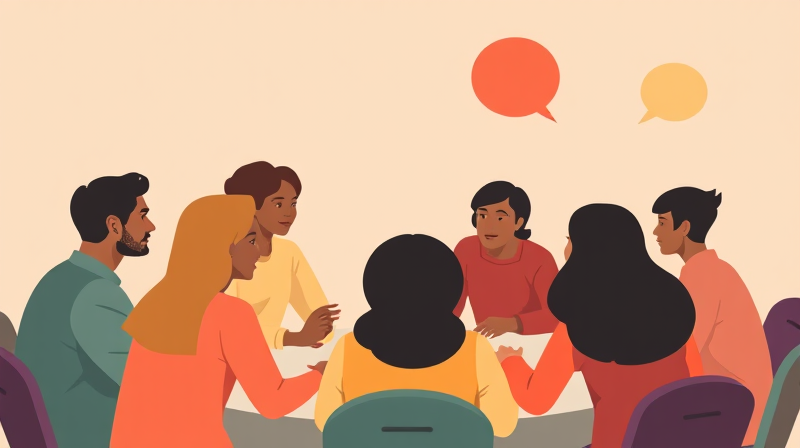In a time when societal divisions seem increasingly stark, it has become more important than ever to engage in thoughtful and respectful debate. When current events polarize opinions, communities and educational institutions have a responsibility to build bridges across ideological divides. By embracing methods that promote inclusive discussions, we can transform contentious conversations into opportunities for mutual understanding and growth.
Across the United States and beyond, leaders are setting up spaces where dialogue about divisive issues can thrive. These initiatives are not just about exchanging opinions, but are valued as an essential part of democratic practice.
Creating Safe Spaces for Dialogue
One of the most effective ways to foster constructive discourse is by creating environments that encourage open, honest, and respectful communication. Universities and organizations are developing dedicated programs to nurture these conversations. For instance, programs like the Civil Discourse Lab empower participants to learn and practice methods for facilitating dialogue in environments that honor every perspective.
Educational institutions are increasingly dedicating time and resources to such causes. Creating safe spaces is a crucial first step. When everyone feels heard and respected, meaningful discussions can take place even on the most polarizing topics. By establishing forums where voices that might otherwise feel marginalized can be amplified, educators and community leaders are creating the blueprint for a more empathetic society.
- Programs and workshops led by experts in the field of communication and debate.
- Designated events focusing on dialogue rather than debate.
- Structured formats that ensure every participant has a chance to speak.
These initiatives not only advance civic education but also support the growth of social capital in diverse communities.
Utilizing AI Tools to Enhance Conversations
In our digital era, leveraging the power of technology has opened up new possibilities for enhancing civil discourse. Modern AI tools are uniquely positioned to help individuals refine their communication skills. For example, conversation practice tools paired with AI avatars provide users with personalized feedback on controversial topics.
The potential of artificial intelligence extends far beyond simple practice sessions. Advanced systems, such as AI mediators, have been developed to help disagreeing groups find common ground. These AI-driven conversational models encourage users to see issues from multiple angles, fostering an environment of empathy and intellectual rigor. Depolarizing technology not only reduces the gap between differing opinions but also reinforces the importance of shared understanding over victory in an argument.
- AI-driven conversational practice platforms.
- Mediator tools dedicated to bridging ideological gaps.
- Systems providing balanced viewpoints to defuse polarization.
The integration of such technologies is a promising path forward in bolstering civil dialogue, allowing every conversation to be an opportunity for growth rather than division.
Implementing Classroom Strategies to Foster Empathy
Within academic settings, educators are uniquely positioned to nurture the skills essential for civil discourse. Role-playing activities, structured debates, and interdisciplinary discussions offer students a controlled environment to engage with controversial topics. These methods encourage learners to step outside their comfort zones and examine issues from diverse perspectives.
Through simulation exercises, students gain a deeper understanding of opposing viewpoints. This practical experience in active listening reinforces the idea that understanding differs from agreeing, and that empathy is a cornerstone of any healthy discussion. Structured classroom strategies not only contribute to academic success but also prepare future leaders for the challenges of an undefined global landscape.
- Role-playing exercises that simulate real-world debates.
- Structured and moderated debates where respect is paramount.
- Interdisciplinary approaches that unify different areas of study.
Such educational techniques underscore the importance of respectful disagreement and lay the groundwork for a society where ideas rise above differences.
Ensuring Constructive Engagement in All Spheres of Life
Beyond formal settings like schools and universities, leaders can also model civil discourse in public spaces. Hosting panel discussions, community forums, and public events dedicated to exploring multiple viewpoints can illustrate the power of respectful dialogues. Leaders who actively participate in these forums demonstrate that curiosity and empathy are as important as authority and knowledge.
Additionally, continuing these conversations outside of the classroom is crucial. Building networks of individuals committed to active listening and continuous learning is essential. By embedding principles of civil discourse into everyday interactions, communities are more resilient in the face of societal challenges.
- Panel discussions and community events that highlight diverse perspectives.
- Regular informal gatherings like monthly lunch discussions.
- Workshops and training sessions for public figures and educators alike.
Ensuring that these practices are not isolated but become embedded in community culture is key to creating enduring change.
Ultimately, a commitment to civil discourse reinforces the shared humanity that binds us all. When people engage in discussions with open minds and respectful hearts, barriers begin to dissolve. By emphasizing our commonalities rather than focusing solely on our differences, we stand a better chance of navigating contentious times with strength and solidarity.
This evolving approach to debate is not without its challenges. However, the benefits of such discourse—enhanced understanding, reduced polarization, and stronger communal ties—are well worth the effort. With every conversation prompted by empathy and respect, society moves closer to a future where dialogue triumphs over discord. The transformative power inherent in civil discourse offers a beacon of hope amid today’s turbulent times.








